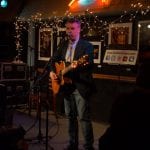The Sacred and the Secular: Murry Hammond’s “I Don’t Know Where I’m Going but I’m On My Way”
Some time ago, my friend Matt and I walked a stretch of train tracks to an old railroad bridge. It was around 10:30 at night. We planned on hopping a train and riding it the 15 miles or so back to his house. I carried a guitar while he toted a pouch full of supplies for recording and documenting our experience.
We came to the bridge, black beams and rusted iron rising perhaps 15 or 20 feet above the ground. We slipped on gravel and clutched at beams as we moved downward, toward our hiding place under the bridge. There was graffiti on the iron, and bits of litter and bottles among the overgrowth. We waited for perhaps an hour. I walked in circles, fingerpicking and singing old train songs. Soon after, we heard it: a lonesome whistle, somewhere in the near distance. Matt strapped the guitar to his back. We stood on the graveled slope and watched. There were more whistles, closer now. After maybe 20 minutes, we saw it, speeding towards us. We raced back to our hiding place. We crouched low. The sound grew louder and louder. The bridge began to vibrate. And then…a mighty roar as the great machine raced by, mere feet above us.
When the engine had passed, we ran up the slope and down the line of trains. They sped past us, one after another. I had never been so close to a speeding train before. I stood frail against an uncompromising force. The noise it made was like heavy wind and thunder. You had to yell to speak over it. For a moment, probably much longer, I was terrified.
The last car sped past and we began running after it, at full sprint, but it was too fast. We stood on the tracks, catching our breath, as the train disappeared into the night, a fading red light.
For some time after, I thought about the great and terrifying locomotive and its place in the history of gospel music. I had never taken the words as sincerely as I did on that particular night, where the great power rushed before my eyes like the angels of Revelation. Many of those old songs recall the wrath and power of God breaking into our lives, whether we like it or not, drawing us into His reign, or leaving us along the tracks.
Murry Hammond, in his record, I Don’t Know Where I’m Going But I’m On My Way, continues those gospel traditions, often drawing upon the history of sacred music, chronicling various riders on their paths to heaven or elsewhere. It’s not exactly a gospel record. Not everyone chooses heaven in the end. But for some of these lost travelers, a light does appear around the bend. A faith is rewarded.
The album opens quietly, with the soft, pulsating strums of Hammond’s guitar, emerging as if out of darkness. His voice, awash in reverb, soon follows.
What are they doing in heaven today?
he asks, not as Washington Phillips once did, with hints of joy, but as if the possibility of heaven is the only hope for a life marred with tribulation.
I’m thinking of friends that I used to know,
No longer living in this world below.
I’ve heard about heaven but I want to know
Oh what are they doing right now?
Hammond follows a road first paved by the Carter Family, Hank Williams, Johnny Cash, and the mountain musicians before them. He interprets old songs and sings new ones that sound old. When writing, he adopts ancient idioms. His words, his patterns of language, like those of the old songs, are peculiar and often ambiguous. The sounds of the record, the echo of his voice, the drone of his harmonium, are as ghostly and as mysterious as the mountains that first gave birth to the tradition.
Hammond, like the Carters, like Williams and Cash, is a man who stands in two worlds: the sacred and the secular. He earns a living playing bass for the rock/alt-country group, Old 97’s, who specialize in songs about love, relationships, and yes, sex; and he is a committed Christian, attending church in Burbank, California when he can, singing of salvation often, and struggling, as we all do, to look Godward.
Of his faith, he says, “I was one of the ones that you might say was ‘cornered’, where I felt like God was trying to get my attention. He got it, and it came during a time of a particular valley I was in. Even now that’s often how I get steered back into ‘the fold’ as it were, when I wander off and am in need of a re-pointing of my compass”.
Hammond, a native Texan, was born into the Southern Christian tradition. His mother and father were both devout and deeply spiritual. Prone to wanderlust at a young age, he fought against their beliefs with much energy, but with little success. His journey of faith hasn’t been a straightforward path. It has been, like the trains he so frequently sings about, full of sharp curves and dead ends. It has moved through deep valleys and traversed cliff walls. It has seen pitch-black nights with only dim lantern light to see by. But through every misstep and back step, through every dark night, he has emerged again, wiser and stronger and further enveloped in the great mystery.
As for living and working in the secular world, he says, “There certainly is a lot of opportunity for vice in rock and roll and I tend to give in to some of it, and other times shake myself out of it and look deeper, and higher. The equation is an age-old one: the more worldly I live, the more unhappy and complicated my world gets. Conversely, the higher I shoot, and the more I cling to a universal love, the happier I am and the better I treat people”.
Though not always autobiographical, there are pieces of Hammond in each of his characters. They are all on various tracks, searching hard for something elusive or hidden, whether it be God or love or home or the unknown. He has longed for each of these at some point in his life, and somehow found a few of them.
In the song, “Next Time, Take the Train”, Hammond sings,
Throw it wide and see no end,
Let no one fence or cage you in,
And realize where you have been, and why.
The traveller speaks of finding that place between where you’ve come from and where you’re going. It is in this space that Hammond himself has found clarity. He embraces the places and people that brought him here. He embraces the faith that revived him, again and again. But he is still intrigued and ever excited about the concept of the unknown before him.
* * *
Matt and I walked the tracks until 1:30 in the morning, waiting for another train to pass, but nothing ever came. We talked about the past and the future for hours; the places we came from and the places ahead. Driving home, I listened to I Don’t Know Where I’m Going But I’m on my Way. The train had long rode on. The world had grown quiet. I parked the car and turned to the album’s final track, a song about heaven:
I’m gonna sail on across the wide river
Where my Lord has gone on before.
Where the long look behind turns to family there gathered,
To meet, and to part, no more.
I too grew anxious for that unknown.
Information was gathered through an interview I conducted with Murry Hammond.




